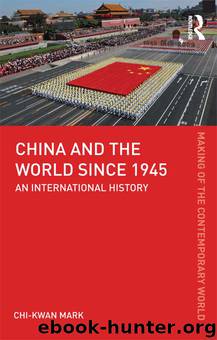China and the World Since 1945: An International History by Chi-Kwan Mark

Author:Chi-Kwan Mark [Mark, Chi-Kwan]
Language: eng
Format: epub
Tags: General, History, Political Science, Social Science, 20th Century, Asia, China, International Relations, Modern, Regional Studies
ISBN: 9780415606509
Publisher: Routledge
Published: 2011-09-11T00:00:00+00:00
Notes
1 See Qiang Zhai, China and the Vietnam Wars, 1950–1975 (Chapel Hill: The University of North Carolina Press, 2000), 112–56.
2 Mao Zedong on Diplomacy, 429–30.
3 See Lorenz Luthi, ‘The Vietnam War and China's Third-Line Defense Planning before the Cultural Revolution, 1964–66’, JCWS 10: 1 (Winter 2008): 26–51.
4 William E. Griffith, Sino-Soviet Relations, 1964–1965 (Cambridge, Mass.: The MIT Press, 1967), 424–42.
5 Chen Jian, Mao's China and the Cold War (Chapel Hill: The University of North Carolina Press, 2001), 209–11.
6 James G. Hershberg and Chen Jian, ‘Reading and Warning the Likely Enemy: China's Signals to the United States about Vietnam’, IHR 27: 1 (March 2005): 47–84.
7 Chen, op. cit., 221–9.
8 Odd Arne Westad, The Global Cold War: Third World Interventions and the Making of Our Times (Cambridge: Cambridge University Press, 2005), 160–70.
9 Li Danhui, ‘The Sino-Soviet Dispute over Assistance for Vietnam's Anti-American War, 1965–72’, in Priscilla Roberts (ed.), Behind the Bamboo Curtain: China, Vietnam, and the World beyond Asia (Stanford: Stanford University Press, 2006), 289–304, 311–13.
10 Zhai, op. cit., 157–68.
11 Barbara Barnouin and Yu Changgen, Chinese Foreign Policy During the Cultural Revolution (London: Kegan Paul International, 1998), 57–61.
12 Xiaohong Liu, Chinese Ambassadors: The Rise of Diplomatic Professionalism since 1949 (Hong Kong: Hong Kong University Press, 2001), 114–15.
13 I borrowed the term from Lorenz M. Luthi, ‘The Origins of Proletarian Diplomacy: The Chinese Attack on the American Embassy in the Soviet Union, 4 March 1965’, CWH 9: 3 (August 2009): 411–26.
14 See ibid.
15 Sergey Radchenko, Two Suns in the Heavens: The Sino-Soviet Struggle for Supremacy, 1962–1967 (Stanford: Stanford University Press, 2009), 178–80.
16 Ibid., 188–95.
17 Ma Jisen, The Cultural Revolution in the Foreign Ministry of China (Hong Kong: The Chinese University Press, 2004), 165–7.
18 Philippe Ardant, ‘Chinese Diplomatic Practice during the Cultural Revolution’, in Jerome Alan Cohen (ed.), China's Practice of International Law: Some Case Studies (Cambridge, Mass.: Harvard University Press, 1972), 99–102.
19 Anne-Marie Brady, Making the Foreign Serve China: Managing Foreigners in the People's Republic (Lanham: Rowman & Littlefield, 2003), 164–5.
20 Barnouin and Yu, op. cit., 74–5.
21 Ma, op. cit., 178–88.
22 Ibid., 205–6; Barnouin and Yu, op. cit., 27–9.
23 Gong Li, ‘China Decision Making and the Thawing of U.S.–China Relations’, in Robert S. Ross and Jiang Changbin (eds), Re-examining the Cold War: U.S.–China Diplomacy, 1954–1973 (Cambridge, Mass.: Harvard University Press, 2001), 323.
24 See Chi-kwan Mark, ‘Hostage Diplomacy: Britain, China, and the Politics of Negotiation, 1967–69’, Diplomacy & Statecraft 20: 3 (September 2009): 473–93.
25 Westad, op. cit., 184.
26 Melvin Gurtov, ‘The Foreign Ministry and Foreign Affairs during the Cultural Revolution’, CQ 40 (October–December 1969): 102.
27 Lu Ning, The Dynamics of Foreign Policy Decisionmaking in China (Boulder: Westview Press, 1997), 59.
28 Peter Van Ness, Revolution and Chinese Foreign Policy: Peking's Support for Wars of National Liberation (Berkeley: University of California Press, 1970), 237.
29 Ibid., 196.
Download
This site does not store any files on its server. We only index and link to content provided by other sites. Please contact the content providers to delete copyright contents if any and email us, we'll remove relevant links or contents immediately.
| Anthropology | Archaeology |
| Philosophy | Politics & Government |
| Social Sciences | Sociology |
| Women's Studies |
The Secret History by Donna Tartt(19052)
The Social Justice Warrior Handbook by Lisa De Pasquale(12187)
Thirteen Reasons Why by Jay Asher(8893)
This Is How You Lose Her by Junot Diaz(6877)
Weapons of Math Destruction by Cathy O'Neil(6264)
Zero to One by Peter Thiel(5786)
Beartown by Fredrik Backman(5737)
The Myth of the Strong Leader by Archie Brown(5499)
The Fire Next Time by James Baldwin(5431)
How Democracies Die by Steven Levitsky & Daniel Ziblatt(5215)
Promise Me, Dad by Joe Biden(5141)
Stone's Rules by Roger Stone(5081)
A Higher Loyalty: Truth, Lies, and Leadership by James Comey(4954)
100 Deadly Skills by Clint Emerson(4921)
Rise and Kill First by Ronen Bergman(4779)
Secrecy World by Jake Bernstein(4741)
The David Icke Guide to the Global Conspiracy (and how to end it) by David Icke(4706)
The Farm by Tom Rob Smith(4502)
The Doomsday Machine by Daniel Ellsberg(4484)
